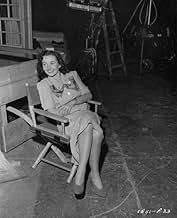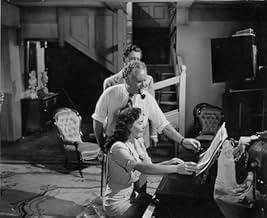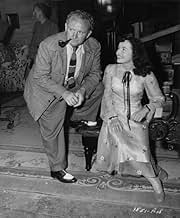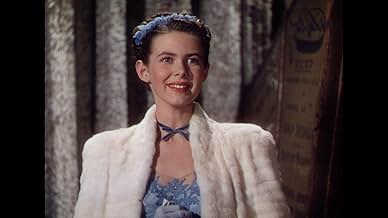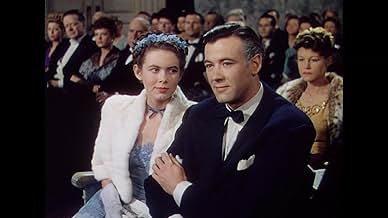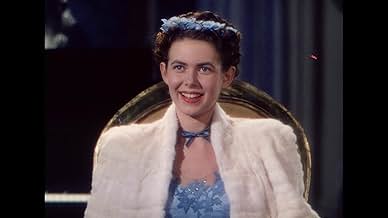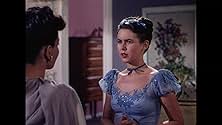AVALIAÇÃO DA IMDb
6,4/10
399
SUA AVALIAÇÃO
Adicionar um enredo no seu idiomaA beautiful young concert pianist is torn between her attraction to her arrogant but brilliant maestro and her love for a farm boy she left back home.A beautiful young concert pianist is torn between her attraction to her arrogant but brilliant maestro and her love for a farm boy she left back home.A beautiful young concert pianist is torn between her attraction to her arrogant but brilliant maestro and her love for a farm boy she left back home.
- Prêmios
- 2 vitórias no total
Bill Carter
- George Sampter
- (as William Carter)
Maria Ouspenskaya
- Madame Goronoff
- (as Mme. Maria Ouspenskaya)
Lillian Bronson
- Music Teacher
- (não creditado)
Edgar Caldwell
- Call Boy
- (não creditado)
Paulina Carter
- 12 Year Old Girl
- (não creditado)
Maurice Cass
- Music Teacher
- (não creditado)
Charles Coleman
- Butler
- (não creditado)
Avaliações em destaque
Borzage's romantic melodrama follows a gifted young (female) pianist torn between her egomaniacal maestro and the absurdly good young farm boy she grew up with (played by a creepy, almost psychopathically serene Bill Carter). The music is really played by Arthur Rubinstein (who was given a huge paycheck for the time, especially considering the studio, Republic pictures, whose first color film this was) and features some great - if in the end excessive - pieces by Rachmoninoff and others. The characters are ultimately uninteresting and so sadly it hardly matters who ends up with whom, though everyone tries their best. It's all very nice though ultimately forgettable. The highpoint of this rather lavish production is the beautiful technicolor cinematography, which is quite nicely captured in the print restored by UCLA that is used on the laserdisc and VHS tape editions.
"I've Always Loved You" is a 1946 production from Republic Pictures directed by Frank Borzage from a script by Borden Chase based on a magazine short story he'd published called "Concerto." In the mid-1940's, as World War II was winding down, Republic Pictures founder Herbert Yates, like other Hollywood studio owners, saw that the "B" picture was doomed and decided to push his company towards major-studio status by hiring important talents behind the camera: Ben Hecht for "Voice in the Wind," Orson Welles for "Macbeth" and Borzage under a long-term contract under which Yates would bankroll him in the sorts of big, romantic tear-jerkers that had been Borzage's specialty since his star-making film, "Seventh Heaven," in 1927. Oddly, the first film Borzage wanted to make at Republic was a John Wayne Western called Dakota, but Yates took that film away from both Borzage and Wayne and sent the script down his "B" Western assembly line instead. Borzage ended up hooking up with writer Chase, who came up with a tale that served as an excuse for Borzage to put a lot of great classical music on the screen, most of it played by pianist Artur Rubinstein (there are a few bits by a Republic studio orchestra as well), as well as staging the familiar romantic situations for which Borzage was famous.
The film opens in Philadelphia, where the world-renowned pianist and conductor Leopold Goronoff (Philip Dorn, an actor Warner Bros. had signed and tried to build into a sort of bionic combination of Paul Lukas and Claude Rains) is holding open auditions for a one-year scholarship for piano students. Goronoff's old friend Frederick Hassman (Felix Bressart), himself a formerly great concert pianist until he married an American woman and settled down in the farm town from which she had come, retiring from music and ultimately ruining his hands with farm work, shows up at the audition with his daughter Myra (Catherine McLeod). For all the money Herbert Yates threw at this movie, including paying for three-strip Technicolor and getting "name" talents behind the camera, he didn't go for star actors in the cast, and I got the impression Borzage had cast McLeod less for any acting ability than that she was a good enough pianist herself she could synchronize on screen with Rubinstein's playing and we could actually see her fingers striking piano keys instead of those awful shots with the body of the piano interposed between the camera and her hands. Goronoff thinks Myra is so good a pianist he offers to take her under his wing and let her move in with him - though since this is a 1946 movie, he does not insist that she become his mistress as part of the deal the way Lowell Sherman did with Madge Evans in a similar situation in the 1932 film "The Greeks Had a Word for Them," a.k.a. "Three Broadway Girls." Indeed, Myra's virtue is in no danger because she's protected not only by the Production Code but the formidable chaperoning of Goronoff's mother, played by Maria Ouspenskaya, billed with the honorific "Madame" in front of her name and easily taking the acting honors in this film. She makes a concert debut but the experience is so traumatic that she goes back to daddy's farm and accepts the marriage proposal of George Sampter (William Carter, a rather gangly but still nice-looking man whom we first get to see wearing jeans below the waist and nothing above it), and a couple of jump-cuts later Myra and George have a 17-year-old daughter who has dreams of piano stardom herself.
"I've Always Loved You" is a beautiful film when the characters are shown actually making music, but it's annoyingly sexist when they aren't; not only does Goronoff make a couple of blatantly anti-woman speeches to the effect that music is a man's world and women don't belong in it (ironic since at the time the film was made one of the world's top classical pianists was not only a woman but had the same first name as this film's heroine and a similar last name, too: Dame Myra Hess), but the whole story is framed as a contrast between Myra's pursuit of a musical career and her desire for a "normal" life as a wife and mother. Quite a few 1930's and 1940's movies set up that dichotomy for women seeking careers in singing, playing or dancing, and one of the few that didn't resolve its plot in that sexist fashion was a quite remarkable film from Republic's first decade as a studio, "Follow Your Heart," in which former Metropolitan Opera soprano Marion Talley played a woman who's encouraged at the end to "follow your heart" and go for the big operatic career rather than marry the small-town boyfriend and give up her dreams of stardom. Mostly, though, we got endings like the sexist cop-out of the otherwise magnificent film "Maytime" (1937), the best of the eight Jeanette MacDonald-Nelson Eddy movies, in which the aging diva Marcia Mornay (MacDonald) tells the young aspiring opera singer that the career isn't worth the heartbreak it entails and she should stay home and marry her boring boyfriend instead. In "The Red Shoes" (1948) the dilemma literally tears the central character, aspiring ballerina Moira Shearer, apart: torn between the choreographer who says she has to renounce love for her career and the composer who wants to write for her and also to marry her, she runs away after her performance and gets killed when she falls off a trestle into the path of an oncoming train: another annoying sexist cop-out ending to what's otherwise a great film. "I've Always Loved You" is hardly in the league of "Maytime" or "The Red Shoes" as a movie, but it shares with them this annoying streak of sexism that makes it a trial to sit through.
The film opens in Philadelphia, where the world-renowned pianist and conductor Leopold Goronoff (Philip Dorn, an actor Warner Bros. had signed and tried to build into a sort of bionic combination of Paul Lukas and Claude Rains) is holding open auditions for a one-year scholarship for piano students. Goronoff's old friend Frederick Hassman (Felix Bressart), himself a formerly great concert pianist until he married an American woman and settled down in the farm town from which she had come, retiring from music and ultimately ruining his hands with farm work, shows up at the audition with his daughter Myra (Catherine McLeod). For all the money Herbert Yates threw at this movie, including paying for three-strip Technicolor and getting "name" talents behind the camera, he didn't go for star actors in the cast, and I got the impression Borzage had cast McLeod less for any acting ability than that she was a good enough pianist herself she could synchronize on screen with Rubinstein's playing and we could actually see her fingers striking piano keys instead of those awful shots with the body of the piano interposed between the camera and her hands. Goronoff thinks Myra is so good a pianist he offers to take her under his wing and let her move in with him - though since this is a 1946 movie, he does not insist that she become his mistress as part of the deal the way Lowell Sherman did with Madge Evans in a similar situation in the 1932 film "The Greeks Had a Word for Them," a.k.a. "Three Broadway Girls." Indeed, Myra's virtue is in no danger because she's protected not only by the Production Code but the formidable chaperoning of Goronoff's mother, played by Maria Ouspenskaya, billed with the honorific "Madame" in front of her name and easily taking the acting honors in this film. She makes a concert debut but the experience is so traumatic that she goes back to daddy's farm and accepts the marriage proposal of George Sampter (William Carter, a rather gangly but still nice-looking man whom we first get to see wearing jeans below the waist and nothing above it), and a couple of jump-cuts later Myra and George have a 17-year-old daughter who has dreams of piano stardom herself.
"I've Always Loved You" is a beautiful film when the characters are shown actually making music, but it's annoyingly sexist when they aren't; not only does Goronoff make a couple of blatantly anti-woman speeches to the effect that music is a man's world and women don't belong in it (ironic since at the time the film was made one of the world's top classical pianists was not only a woman but had the same first name as this film's heroine and a similar last name, too: Dame Myra Hess), but the whole story is framed as a contrast between Myra's pursuit of a musical career and her desire for a "normal" life as a wife and mother. Quite a few 1930's and 1940's movies set up that dichotomy for women seeking careers in singing, playing or dancing, and one of the few that didn't resolve its plot in that sexist fashion was a quite remarkable film from Republic's first decade as a studio, "Follow Your Heart," in which former Metropolitan Opera soprano Marion Talley played a woman who's encouraged at the end to "follow your heart" and go for the big operatic career rather than marry the small-town boyfriend and give up her dreams of stardom. Mostly, though, we got endings like the sexist cop-out of the otherwise magnificent film "Maytime" (1937), the best of the eight Jeanette MacDonald-Nelson Eddy movies, in which the aging diva Marcia Mornay (MacDonald) tells the young aspiring opera singer that the career isn't worth the heartbreak it entails and she should stay home and marry her boring boyfriend instead. In "The Red Shoes" (1948) the dilemma literally tears the central character, aspiring ballerina Moira Shearer, apart: torn between the choreographer who says she has to renounce love for her career and the composer who wants to write for her and also to marry her, she runs away after her performance and gets killed when she falls off a trestle into the path of an oncoming train: another annoying sexist cop-out ending to what's otherwise a great film. "I've Always Loved You" is hardly in the league of "Maytime" or "The Red Shoes" as a movie, but it shares with them this annoying streak of sexism that makes it a trial to sit through.
It's a very good story, like an interesting experiment in musical psychology, delving into and trying to reach the very essence and nature of the extreme sensitivity of the musical sense, but the acting is a bit stiff, and the story, although tremendously good and interesting, doesn't quite come alive. Catherine McLeod saves the picture, her acting is wholly satisfactory and convincing all the way, but the others are at times a bit too wooden. Philip Dorn is more abominable than not as the utterly rude and indecent conductor who thinks he can go at any length in insulting Catherine in the name of music, and no wonder she abandons music on conditions like that. There are many details in this artificial set-up that just don't work, they are neither credible nor natural, but there is nothing wrong with the idea. Although Frank Borzage made several films of music, and they are all good, it's over-evident that he was no musician himself.
On the whole, forget the flaws in the acting, the direction and the lack of musical realism but please follow and study the idea and the story, because the thoughts behind all this were humanly and psychologivally very interesting indeed.
On the whole, forget the flaws in the acting, the direction and the lack of musical realism but please follow and study the idea and the story, because the thoughts behind all this were humanly and psychologivally very interesting indeed.
...and I always will...
Some say his post WW2 works were inferior to the thirties major works .Perhaps so.But it is no reason to dismiss them.
"I've always loved you" is unique,it defines music as a way of communicating emotions.Leopold and Myra use Rachmaninoff (mainly "Second" ),Beethoven ,Lizt and other musicians to express their admiration,their tenderness,their love,their jealousy,their pride,their lust for life,their hate,their contempt ,you name it.In the central scene ,where Myra plays the piano with Leopold's full symphonic orchestra is a real desperate fight ,probably the best concert scene ever filmed (with the eventual exception of Hitchcock's "the man who knew too much" (1956))And that scene is followed by another one where the two musicians ,although miles apart ,continue their "conversation" in a strange telepathy.
The audience who knows Borzage's earlier works (such as "three comrades" "little man what now?" "mortal storm" "cargo" ...) might be disoriented while watching the beginning of the movie .But the master's touch is still here.
Two elements are Borzagesque:the first is George's character.He is akin to Hans ("little man" ) and to the "three comrades" .He is the man who believes in true love ,the simple man who is like a bull in a china shop when he attends the first concert but whose heart is always in the right place.
And the other one is Mme Maria Ouspenskaya (she is granted a "Mme" during the cast and credits!) who was the unforgettable mother of Martin (James Stewart) in Borzage's memorable "mortal storm" .Here she portrays Leopold's mother with authority.Her death is a great moment of delicacy when the music stops in her hand.
Probably not as appealing as Borzage's earlier works,this film is yet waiting to be rediscovered.
Some say his post WW2 works were inferior to the thirties major works .Perhaps so.But it is no reason to dismiss them.
"I've always loved you" is unique,it defines music as a way of communicating emotions.Leopold and Myra use Rachmaninoff (mainly "Second" ),Beethoven ,Lizt and other musicians to express their admiration,their tenderness,their love,their jealousy,their pride,their lust for life,their hate,their contempt ,you name it.In the central scene ,where Myra plays the piano with Leopold's full symphonic orchestra is a real desperate fight ,probably the best concert scene ever filmed (with the eventual exception of Hitchcock's "the man who knew too much" (1956))And that scene is followed by another one where the two musicians ,although miles apart ,continue their "conversation" in a strange telepathy.
The audience who knows Borzage's earlier works (such as "three comrades" "little man what now?" "mortal storm" "cargo" ...) might be disoriented while watching the beginning of the movie .But the master's touch is still here.
Two elements are Borzagesque:the first is George's character.He is akin to Hans ("little man" ) and to the "three comrades" .He is the man who believes in true love ,the simple man who is like a bull in a china shop when he attends the first concert but whose heart is always in the right place.
And the other one is Mme Maria Ouspenskaya (she is granted a "Mme" during the cast and credits!) who was the unforgettable mother of Martin (James Stewart) in Borzage's memorable "mortal storm" .Here she portrays Leopold's mother with authority.Her death is a great moment of delicacy when the music stops in her hand.
Probably not as appealing as Borzage's earlier works,this film is yet waiting to be rediscovered.
The Dutch actor Philip Dorn plays a concert maestro, Leopold Goronoff, in this film. He's reputed to be one of the greatest pianists of his age....and he definitely has the ego for this...and then some! An old friend convinces Goronoff to take on a student and Myra (Catherine McLeod) is amazing. Eventually, she has her debut and Goronoff is angry because she is so good...perhaps better than him! What a putz! Despite this, Myra is in love with her mentor....and what chance does her childhood friend, George, have with her?
There are several problems with the film, though on balance the movie isn't bad. There are too many long and intense piano pieces and editing them down a bit or allowing for some lighter classical pieces would have helped the film. Additionally, Dorn's character is simply too awful to care about him and there is no reason for Myra to care about this jerk..none.. It's also very slow and the film doesn't seem to know when to end. On the plus side, McLeod is amazing on the piano, the Technicolor is amazingly good and the basic story is quite sound.
There are several problems with the film, though on balance the movie isn't bad. There are too many long and intense piano pieces and editing them down a bit or allowing for some lighter classical pieces would have helped the film. Additionally, Dorn's character is simply too awful to care about him and there is no reason for Myra to care about this jerk..none.. It's also very slow and the film doesn't seem to know when to end. On the plus side, McLeod is amazing on the piano, the Technicolor is amazingly good and the basic story is quite sound.
Você sabia?
- CuriosidadesThis was Republic's first feature in Technicolor.
- Cenas durante ou pós-créditosThe Republic Pictures logo does not appear on this film.
- ConexõesSpoofed in It's a Grand Old Nag (1947)
Principais escolhas
Faça login para avaliar e ver a lista de recomendações personalizadas
Detalhes
- Data de lançamento
- País de origem
- Idioma
- Também conhecido como
- I've Always Loved You
- Locações de filme
- Empresa de produção
- Consulte mais créditos da empresa na IMDbPro
- Tempo de duração
- 1 h 57 min(117 min)
- Cor
- Proporção
- 1.37 : 1
Contribua para esta página
Sugerir uma alteração ou adicionar conteúdo ausente

